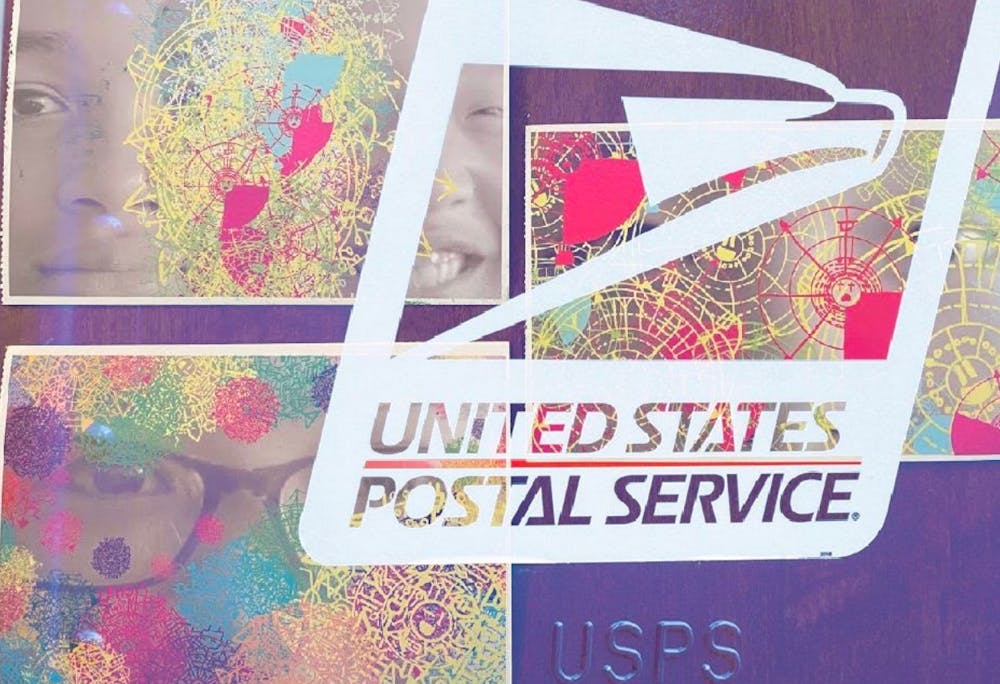Like many other employees across the nation, staff members at Asian Arts Initiative (AAI) shifted their work online in the wake of coronavirus. Usual in–person activities were readily replaced with Zoom meetings, breakout sessions, and quick email threads. To recreate a sense of connection, Cat Ramirez launched the AAI Pen Pals Project in April, giving staff members the opportunity to send handwritten postcards to each other. In September, the AAI Pen Pals Project was re–launched and redirected for an additional cause: raising funds for the struggling USPS.
Due to the coronavirus pandemic, The USPS has been placed in a dire financial situation. Although the postal service is continuing to weather a major revenue downfall, the Trump administration has rejected bailout packages that would save the USPS from closing altogether. Not only does this create uncertainty around voting–by–mail for the 2020 election, but also puts vulnerable communities that depend upon the USPS’s services at risk.
During this time, Cat Ramirez saw the opportunity to take action. “When Trump was setting [USPS] on a really dire path, we thought we could use this platform to continue distributing information on why the USPS is important. It's definitely an issue about mail–in voting, but the USPS is also necessary for package delivery, and various other needs,” they said. “We wanted to use this program to both raise awareness of the full breadth of the USPS and raise money by purchasing stamps.”
If the USPS is harmed further, those living in rural areas and on Indigenous land will be endangered as they rely on the USPS for staples like medication. In addition, higher shopping prices and lower profit margins would place local businesses at risk. Furthermore, the USPS provides financial services that do not require customers have a bank account. By taking the banking system out of the equation, the USPS allows the institutionally disenfranchised to have access to affordable financial services.
As Cat relaunched the AAI Pen Pals Project, artists and writers alike got creative with their messages. “Everyone who’s written a post card has written a wide variety of things, from really deep check–ins with people, to super goofy short stories, doodles of butts, and creative collages. It’s really lovely to maintain some sort of art practice and communication,” she said.

The project also gave members of the AAI community the opportunity to reconnect beyond the virtual sphere. “Typically, we rely on in–person activities and theater events, so this was a different way for us to reach out, not just as artists but as people. This was a way for us to tune into just the excitement of just sending and receiving mail,” said Dave Kyu, the Senior Community Programs Manager at AAI.
The combination of creative postcards, political activism, and communication strikes a chord with Asian Arts Initiative’s overall mission: to create community through the power of art. “As socially engaged artists, we can position ourselves as critics and observers. We are imagining how the world can be slightly different, how the world can serve as a utopia and how we can try to make things better,” Dave said. “This doesn’t always present itself radically, sometimes we are just repositioning people within a situation to just bring out their own agency and respect their own voice.”
With this in mind, the Pen Pals program embodies that quieter form of radicalism and activism, allowing artists and writers to uphold an essential social service while practicing what they love. “I think Pen Pals is a great program because it allows people to exercise their agency and voice. The revolution is not always a radical left upheaval, it can also be allowing people to find their authentic voice and own it. Once we understand who we are, then we can make demands of our greater systems,” Dave emphasized.
When it comes to social change, art holds the ability to communicate universally. “Toni Cade Bambara said, ‘the role of the artist is to make the revolution irresistible’ and that is what I hold really close in creating work,” Cat said. “Something that I love about the work that AAI—and so many powerful organizations in Philadelphia—do, is [they use] art to open people’s minds to different realities, or a reality of a future we haven’t envisioned yet. Art is something that allows you to see that in a tangible way. That spurs feeling, which then spurs action.”
As the 2020 election looms ahead, sending postcards and purchasing stamps serve as a simple, powerful, and effective force of change. It merges the purpose of art activism and handwritten communication during the era of virtual work.







